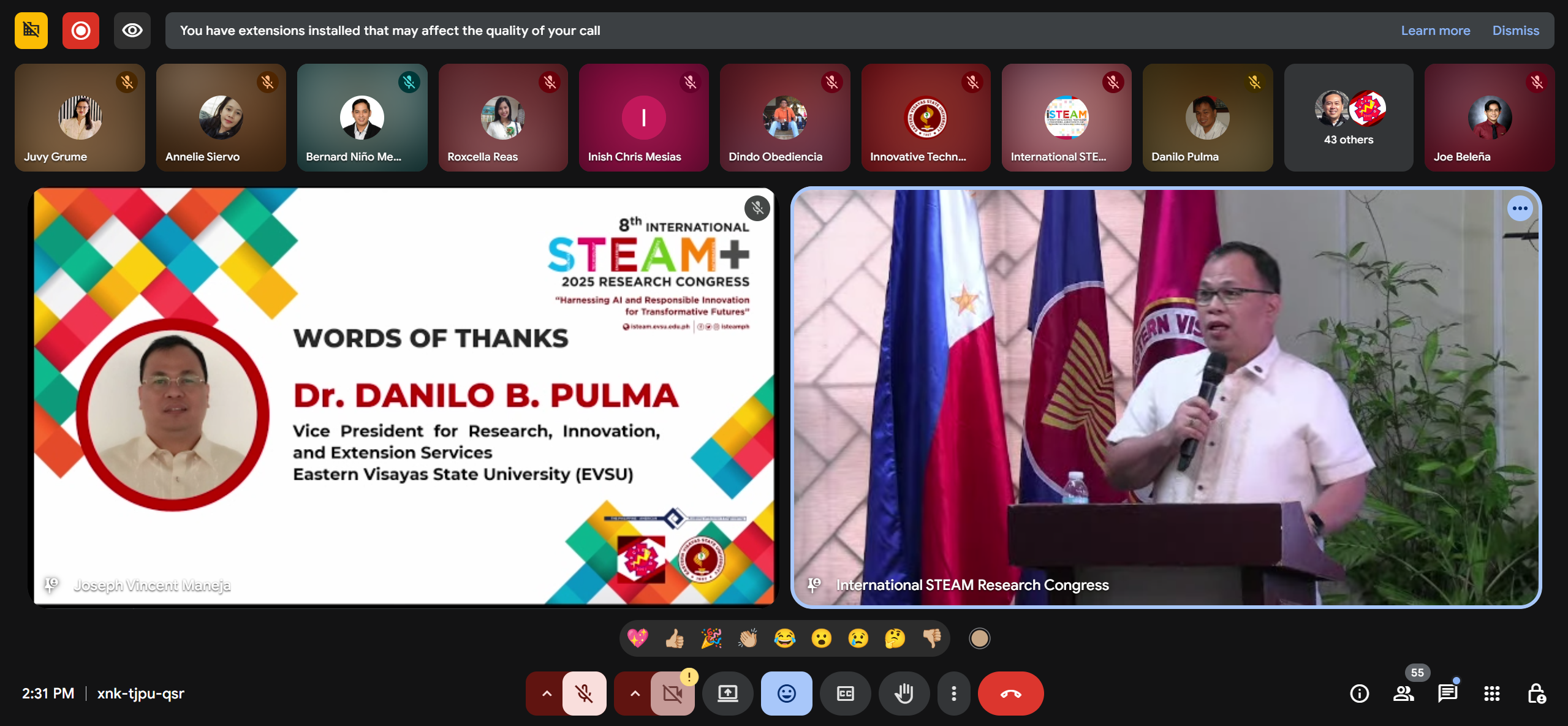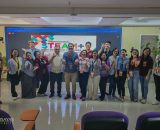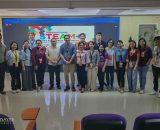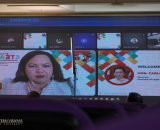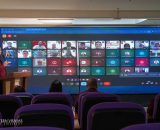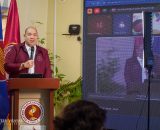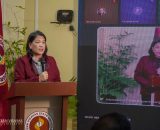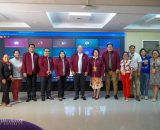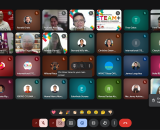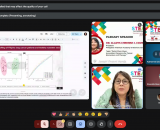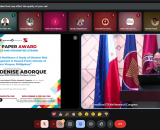Eastern Visayas State University hosted anew the prestigious 8th International Science, Technology, Engineering, Agri-fisheries, Mathematics plus (Economics and Humanities) iSTEAM+ 2025 research congress with the theme “Harnessing AI and Responsible Innovation for Transformative Futures,” on November 12-13, 2025 via Google Meet.
Co-hosted by Philippine- American Academy of Science and Engineering (PAASE) and the Eastern Visayas Consortium for Industry, Energy, and Emerging Technology Research and Development (EVCIEERD), the colloquium brought together researchers, scientists, professors, innovators, and teachers to share their body of knowledge through their research.
Committed to fostering innovation and excellence, ESVU President Dennis C. de Paz strengthens the region’s capacity for research and development, citing UNESCO’s initiatives in advancing innovation and technology. “UNESCO recently convened a high-level potential dialogue in fostering an AI enabled Higher education ecosystem, resulting in a joint action plan that aid at building AI and digital competencies among the higher education workforce. This demonstrates how higher education institutions worldwide are being called not only to adopt AI but to reimagine pedagogy, research, and governance in light of rapid digital transformation,” Dr. de Paz stated.
In her welcome message, Hon. Raissa Villasin, who delivered the speech on behalf of Hon. Carlos Jericho L. Petilla, underscored the vital role of AI in driving progress and fostering sustainability. “As AI continues to redefine the boundaries of possibility, it is our shared responsibility to ensure that innovation remains anchored in ethics, inclusivity, and human development,” she asserted. Likewise, Ms. Grace Sodario Gozo, representing Hon. Alfred Romualdez, affirmed the indispensable role of technological advancement in propelling a brighter future and improving the quality of life. “These advances remind us that innovation must always serve people; it must make communities safer, expand access and opportunities, and strengthen our capacity to withstand the growing threats of disasters and a changing climate,” she emphasized.
Dr. Shirley Agrupis, CHED Chairperson, held a positive view that artificial intelligence revitalizes the ever-evolving society, yet underscores the appraisal of value and integrity towards its use. “This year’s congress takes on forward-looking mission to ensure that our research and innovation ecosystem remains human-centered, ethical, and inclusive amid rapid achievement in artificial intelligence,” Commissioner Agrupis affirmed.
Dr. Alvin Culaba, the Vice-President of the National Academy of Science and Technology (NAST) Philippines and the Commissioner on Science and Technology of the UNESCO National Commission of the Philippines (UNACOM), delivered his keynote speech, which focused on the responsible Artificial Intelligence and the Science of transformative futures. He further underscored the four (4) anchors of responsive innovation, namely—human dignity must remain non—negotiable, inclusion and equity, environmental sustainability, and participation and cocreation.
In addition, he posed concrete challenges to the participants: (1) develop at least one flagship AI program for good initiative; (2) integrate ethics and futures thinking into all strands; and (3) build an ISTEAM plus community practice on responsible AI. Meanwhile, he left with a reflection to ponder that in order to build transformative futures, we need participatory futures: Barangay consultation to the impacts of digital tools and co-design of AI services with teachers, farmers, fisherfolks, and youths.
Specializing in bioprocessing, separation, and purification engineering, and microalgae bioengineering, Dr. Pau-Loke Show, Professor of Biochemical Engineering at the University of Nottingham, Malaysia, and Khalifa University, Abu Dhabi, UAE, shared insights from his extensive study. His pivotal thesis boils down to Microalgae biorefinery, which has recently made a lot of progress, becoming an important field for both clean energy and producing valuable products that benefit the environment and industry.
Dr. Gladys Cherisse J. Completo, President of the Philippine-American Academy of Science and Engineering (PAASE), emphasized the importance of data-driven glyco-innovation through her presentation titled “Glycomics and Glycoproteomics for Cancer Biomarkers.”
Focusing on the advancement of iSTEAM in response to the Twin Transformation, Dr. Shu-yuan (Sean) Pan, Associate Professor at the College of Bio-Resources and Agriculture, National Taiwan University, highlighted innovative approaches in research and innovation. He encouraged the audience to integrate circular, low-carbon and climate smart agriculture. These include negative carbon mechanism of regenerative agriculture, biogenic nitrification inhibitors and the synergistic effects in emission, reduction and carbon sequestration with biochar technology, dynamic and intelligent knowledge traceability of agricultural products, co prosperity with food and agriculture -social innovation practice, and international connections and talent cultivation programs.
Prof. TS. Dr. Mohd Razif Harun, Deputy Dean Graduate Studies and International, Universiti Putra Malaysia introduced a topic on Microalgae: A Sustainable Resource for Diverse Industrial and Environmental Transformations. Primarily, he chose microalgae as the focus of his study because of scalability, productivity, sustainability, and genetic engineerability. This follows a process for microalgae production including cultivation, harvesting, extraction, and purification.
Finalizing the complete roster of colloquium speakers, Dr. Leila S. Africa, Professor, Division Head, Institute of Human and Food Nutrition, University of the Philippines-Los Banos whose topic on Quality Check in the Philippine Operation Timbang, intersected nutrition policy, food and nutrition program planning, and operational systems for child growth monitoring. Her discussion boiled down to the importance of quality checking and data validation in the annual Philippine nutrition surveillance activity called Operation Timbang Plus (OPT Plus).
The research congress also acknowledged Dr. Ronald Orale, Professor from Samar State University, and Professor Annelie Siervo of University of Eastern Philippines for their research studies which earned the best paper awards from last year’s ISTEAM+.
Advancing research colloquiums and championing new initiatives, Dr. Danilo Pulma, Vice President for Research, Internationalization, and Extension Services, strengthens the institution’s research capacity through his committed leadership, reminding the participants to cultivate progress and embrace reconstructive innovation. “In the spirit of our theme, may we continue to harness AI and responsible innovation not just for progress, but for people, for the future that is inclusive, ethical, and transformative,” he stated.
Moreover, Dr. Pulma led the launching of the 9th ISTEAM+ 2026 through the unveiling of the theme—S & T for Humanity: Advancing ethical, inclusive, and sustainable innovation. This will be held on May 2026 in Eastern Visayas State University.
The winners of the 8th iSTEAM+ Research Congress included Inish Chris P. Mesias from Visayas State University, Baybay City, Leyte, Philippines, for the Science Strand with “Microbial Risk Assessment of E. coli in Street-Vended Cassava-Based Delicacies in the Philippines Using Combase and Monte Carlo Simulation.” The Technology Strand was awarded to Neil M. Pascual and Dindo C. Obediencia for “Autokey Cipher Redefined: An Enhanced Encryption and Decryption Approach.” In the Engineering Strand, Cong-Wei Su, Elisha Marie Torres, Felipe Joel Galaz, and Hsiao-Yeh Chu from Kun Shan University, Tainan, Taiwan, won for “Study on Enhancing Bearing Self-Repair and Lubrication Performance Using Grease Additives of Serpentine or Nano-Diamond.” The Agri-Fisheries and Nutrition and Dietetics Strand recognized Bryan Joseph E. Matillano from the University of San Carlos, Cebu City, Philippines, for “Validating a Case Investigation Form for Box Jellyfish Envenomation in the Philippines Surveillance System.” Finally, the Humanities and Economics Strand honored Rienze Denise Aborque from Eastern Visayas State University – Carigara Campus for “Vulnerability and Resilience: A Study of Disaster Risk Reduction Management in Hazard-Prone Schools of Eastern Visayas, Philippines.”
This article is aligned with Sustainable Development Goal (SDG) 09: Industry, Innovation, Technology, and Infrastructure and SDG 17: Partnerships for the goals
via J Genobiagon | UMDC




